On the shores of Pointe Indienne, along the Atlantic Ocean, a large olive ridley sea turtle is unable to move. Tired after being caught in fishermen's nets and kept in a dugout canoe until Jean Félix Tchibinda Frakata arrived.
Frakata, a former fisherman, has been working alongside marine conservation organization Renatura for more than 10 years, fighting for the protection and preservation of marine turtles in Congo.
Every morning, he tours this area at Pointe Indienne, monitoring the return of fishermen, and checking their nets in order to free accidentally trapped turtles.
After taking notes on some of this turtle's biological data, Frakata helps it get back on track to its natural habitat - the Atlantic Ocean.
This turtle is the 23,647th turtle to be released by the association.
"It's a green turtle that the fishermen caught," explains Frakata. "These species are numerous at Pointe Indienne, especially Pointe Indienne and at Mvassa, there are many."
Frakata deplores the poaching he has witnessed, which he says threatens the species.
One of Renatura's objectives is to provide a protected space for future spawners in the area.
To this end, hatcheries have been set up behind restaurants along the wild coast at Pointe-Noire, an initiative joined by Pascal Baudino, the manager of a restaurant on the beach.
"The point is that the turtles can emerge quickly and feel safe and can hatch in peace, too," he said. "There are 150 baby turtles which come out and go back into the water, especially when there are no stray dogs which sometimes eat them. We see the turtles at night and we clean the area so that anyone who wants to find them cannot take them. Now when we see a turtle's eggs, we take them and place them here. On the site, every year, there are at least four to five turtles that come to lay eggs."
Getting as many people as possible to adhere to protecting marine turtles starts with the young. Renatura is therefore working on educating youngsters about the environment.
Boris Loumingou, a Renatura worker, takes lessons in this local school. Today, the course focuses on sea turtles, and various other nature-related topics.
Student Dorothee Ndeke learns that: "The sea turtle feeds on the jellyfish but cannot electrocute itself because it is the organs that protect it, and we humans if we eat the jellyfish, we will be electrocuted."
She also learns about the dangers of plastic bags to sea turtles.
Thanks to the work done by Renatura since its creation, the turtle population is estimated to be on the rise, according to director Nathalie Mianseko.
"We now know more about the presence of sea turtles in Congolese waters all year round. This allowed us in 2011 to see these species become fully protected in the Republic of Congo, which was one of our greatest successes. Now the next achievement for the association will be the designation of Loango Bay as a marine protected area. It is a very important area for the biology of marine turtles, it is very rich as an area and giving it this protected area status will ultimately improve the protection of these species," she explains.
Thanks to a participatory program for the monitoring and release of accidental catches of marine turtles in artisanal fishing nets, more than 1,500 turtles, mainly located in the village of Pointe Indienne, are freed each year from the meshes of nets.
The Congolese coastline is an important breeding and feeding site, where five of the seven protected species of sea turtles come each year.
A fine of five million CFA (over $9,000 USD) is issued to anyone who sells sea turtles, and a five-year prison sentence can be added.
Renatura also welcomes a decrease in the sale of turtle meat in markets.

